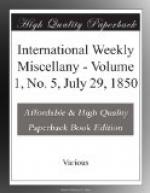In reference to his map of the world, the writer remarks: “We knew in respect to a Northern frozen ocean, but in respect to a Southern frozen ocean we had not heard. So that, when Western men produced maps having a frozen ocean at the extreme South, we supposed that they had made a mistake in not understanding the Chinese language, and had placed that in the South which should have been placed only in the North. But on inquiring of an American, one Abeel, (the Missionary,) he said this doctrine was verily true, and should not be doubted.”
It is a fact full of interest that the chronology adopted in this work is that usually received by European writers. The more prominent facts of sacred history subsequent to the Deluge, are either alluded to, or stated at length, much as they occur in the Scriptures.
It is interesting to us, too, that this work presents to the Chinese a more definite and discriminating view of the different religions of the world, than has yet appeared in the Chinese language.
Speaking of different countries of India under European sway, where Buddhism or Paganism and Protestantism exist together, the author does not hesitate to say that the latter is gradually overcoming the former, “whose light is becoming more and more dim.” This is a very remarkable concession, when we consider that the individual who makes it is probably a Buddhist himself, and represents the religion of China as Buddhism.
It is a remarkable fact, that this work contains a more extensive and correct account of the history and institution of Christian nations than has ever been published before by any heathen writer in any age of the world.
This remarkable work will introduce the “Celestials” to such an acquaintance with “the outside barbarians” as cannot fail to give them new ideas, remove something at least of the insane prejudice against, and contempt of, all other nations, which has so long prevailed. We regard it as a very important agency in preparing the way for that Christianity which the friends of the perishing are seeking to introduce into that benighted empire. A book by a native Chinaman, himself high in office, and recommended by a still higher officer of the government, the author still himself a Pagan, yet reasoning upon the great facts of the Bible, and opening the hitherto unknown civilized and Christian world to his countrymen—such a book cannot but become an important pioneer in the work of pouring the light of truth upon that dark land.—Boston Traveler.
* * * * *
[FROM SARTAIN’S MAGAZINE, FOR AUGUST.]
REQUIEM.
UPON THE DEATH OF FRANCES SARGENT ASGOOD.
BY ANNE C. LYNCH.
To what bright world afar dost thou belong
Thou whose pure soul seemed
not of mortal birth?
From what fair realm of flowers, and love,
and song,
Cam’st thou a star-beam
to our shadowed earth?
What hadst thou done, sweet spirit! in
that sphere,
That thou wert banished here?




